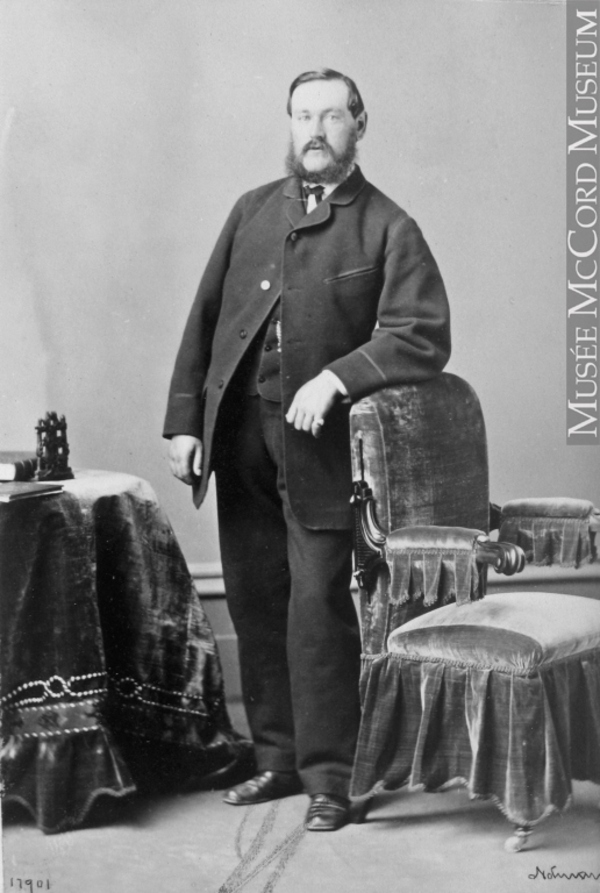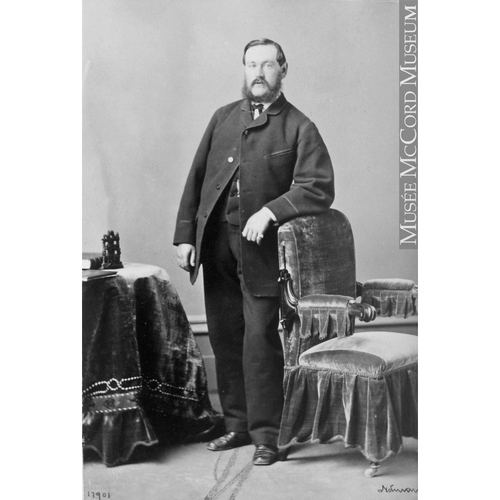
Source: Link
RANKIN, ARTHUR, surveyor, militia officer, showman, mining entrepreneur, and politician; b. 1816 in Montreal, son of George Rankin, teacher, and Mary Stuart; m. 1840 Mary McKee, and they had two sons; d. 13 March 1893 in Windsor, Ont.
Arthur Rankin’s parents immigrated to the Canadas from Ireland after the War of 1812. Never one to do the expected, Arthur ran away from his family and the Petit Séminaire de Montréal at the age of 15 to become a cabin-boy. He returned to the Canadas in 1835, qualified as a surveyor in April 1837, and commenced practice in the Windsor area. After fighting a duel near Windsor, he moved to Toronto and was made a militia ensign in 1837. In that year he combined his lust for adventure with his humanitarian instincts by rescuing an escaped slave in Ohio and spiriting him into Upper Canada. Eager to see action during the rebellions of 1837–38, Rankin transferred to the Essex militia. During the Patriot assault on Windsor in December 1838, he helped lead the counter-attack and captured the Patriot standard. After his discharge in 1843, he organized a group of nine Ojibwa Indians into a “Wild West” show, which he took on a tour of the British Isles. So popular was the show that, in December, it appeared before Queen Victoria at Windsor Castle. In 1844 he sold the show and returned to Canada. A reputation as a showman would precede him into public life.
In 1846, evidently in association with his brother-in-law, Alexander McKee, Rankin was granted a mining location in the Michipicoten area north of Lake Superior. At about the same time he joined his brother Charles Stuart, also a surveyor, in the area north of Lake Huron, where Arthur discovered and exploited copper deposits at Bruce Mines. In the summer of 1847 he sold his interest to the Montreal Mining Company for the enormous price of £30,000. Rankin’s gift lay in discovery, and he preferred to stake out a claim and leave exploitation to the large mining concerns in Montreal. With his profits, he returned to Essex in 1849, determined to enter politics.
He soon ran into conflict with the county’s dominant figure, Colonel John Prince*. At the so-called battle of Windsor in 1838, Prince had gained the laurels even though Rankin had done more fighting. Prince was so powerful in Essex that in the 1851 election for the Legislative Assembly Rankin was compelled to run in Kent. Forsaking his tory views, he stood as a reformer. However, most reformers were not convinced of his conversion, and they preferred George Brown* instead. In 1854 Rankin was ready to challenge Prince in Essex but at the last moment Prince withdrew in favour of his son. Rankin’s support of separate schools may have swung the Roman Catholic vote to him, for he won the election. Finally, in the 1856 election for the Western divisional seat in the Legislative Council, Rankin and Prince confronted one another. During this campaign Rankin ignored issues and, according to the Windsor Herald, hurled “abuse of the lowest description” at Prince. These vitriolic attacks rebounded against Rankin: Prince was elected by a large majority, thoroughly humiliating his opponent.
Rankin’s rivalry with Prince confirmed that, to Rankin, politics was a personal rather than a party affair. In the assembly he remained aloof from both ministry and opposition. A name-calling dispute with Attorney General John A. Macdonald In 1856 led to Macdonald’s querying whether a duel was in order. The incident was settled peaceably, but Rankin had become known as a political maverick. His part in the “southern railway” scandal supported this reputation. In 1857 he became involved in the conflict between Isaac Buchanan* and Samuel Zimmerman* for control of a southern line paralleling the Great Western across the southwest part of the province. Rankin himself lobbied for a charter, presumably sought a bribe from Buchanan, and at one point entered into a secret deal with Zimmerman whereby, if a charter went to Zimmerman and he constructed the line, Rankin would get a quarter of the profits. When Rankin disclosed this last arrangement to an investigating committee of the legislature, he not only revealed the seamy side of the railway business but exposed himself to charges of corruption. To the Toronto Globe in May the affair became the “Rankin Job” and petitions were presented to the assembly seeking his expulsion. Tainted by scandal, Rankin was defeated in the 1857–58 general election in Essex by John McLeod, an Amherstburg businessman and associate of Buchanan in the railway conflict.
After this political humiliation Rankin returned to the one activity at which he had consistent success. He conducted prosperous copper-mining ventures in the area around lakes Superior and Huron. In 1863–64 he mined the Chaudière River region of Lower Canada for gold, but this venture may not have been particularly profitable. In a provincial report in 1865 on the development of Canadian gold-fields, Rankin explained his methods of prospecting: a close study of the “character of the country, and of the rock underlying the superincumbent strata, and of the nature of the clay or earth over all, until I became quite familiar with the appearance of all these, and became convinced I could recognize the same appearances werever I might see them.”
With his fortunes augmented, Rankin returned to Essex politics in the election of 1861 and defeated a former supporter, John O’Connor*. However, before parliament opened, Rankin embarked on his most bizarre adventure. In July 1861 he volunteered to raise a lancer regiment to serve in the Union army in the American Civil War. He discussed the idea with Abraham Lincoln, and in September a warrant was issued to raise the regiment and Rankin was commissioned. It was understood that many of the men would be Canadians and the officers would have British army experience. Most Canadians were aghast that a militia colonel (Rankin had become commander of the 9th Military District in 1856) and a member of the assembly would not only serve in the American army but also recruit Canadians for a foreign power. In October Rankin was arrested in Toronto for breaching the Foreign Enlistment Act. Although he was never convicted, he was compelled to resign his American commission. The lancer regiment never saw action and was disbanded in 1862. The Montreal Gazette summed up this international incident: “There are not many men in Canada better known for his somewhat Quixotic eccentricities than Arthur Rankin.”
Rankin’s vain search for glory (he had also volunteered, in 1854, to raise a regiment for the Crimean War) had convinced any doubters that he remained a showman of dubious reliability. His election of 1861 was voided in 1863. Though John O’Connor won the resulting by-election in Essex, Rankin still held considerable public support, and he won the election of 1863, though by a bare two votes. O’Connor took the seat in the federal election of 1867. Understanding the value of party affiliation and able to deliver many Catholic votes to the Conservative party, O’Connor was rewarded by a position in Macdonald’s cabinet and in 1872 he won an overwhelming victory over Rankin. Rankin nevertheless remained a prominent figure in the Essex region and his erect bearing and aureola of white hair and whiskers gave him the appearance, according to Detroit newspapers, of a “French marshall of the ancien regime.” He occasionally dabbled in local elections but was invariably rejected as a relic of the pre-confederation era. Rankin died in Windsor in 1893.
Although Rankin had failed to play a significant role in politics, he had been a member of the “Great Coalition” of 1864–65 [see George Brown]. During the confederation debates of 1865 his was an eloquent voice in favour of Canadian nationhood. The time had come, he claimed, “to commence the establishment of a nationality for ourselves” or face assimilation by the Americans. Rankin might have hoped to be a delegate in the negotiations leading up to confederation, but he found himself passed over in favour of more reliable men. In the end his many indiscretions had denied him the starring role he had cherished, that of a father of confederation.
NA, MG 26, A, Macdonald to Henry Smith, 1 July 1856. Can., Prov. of, Legislative Assembly, Journals, 14 May 1857; Parl., Confederation debates, 916; Sessional papers, 1865, 1st session, no.17: 87–93. John Prince: a collection of documents, ed. and intro. R. A. Douglas (Toronto, 1980). A short history and description of the Ojibbeway Indians now on a visit to England (London, 1844). Thunder Bay district, 1821–1892: a collection of documents, ed. and intro. [M.] E. Arthur (Toronto, 1973). Essex Record (Windsor, Ont.), 15 Aug. 1872. Evening News (Detroit), 13 March 1893 (clipping in Detroit Public Library, Burton Hist. Coll., C. M. Burton scrapbooks, 3: 151). Globe, 7 Oct. 1851; 3 Aug. 1854; 14 May 1857; 18 July, 7 Oct. 1861; 24 June 1863. Montreal Gazette, 7 Oct. 1861. Windsor Herald, 13 Jan. 1855; 12 Sept., 10, 24 Oct. 1856. J. E. Buja, “Arthur Rankin: a political biography” (ma thesis, Univ. of Windsor, 1982). Assoc. of Ontario Land Surveyors, Annual report (Toronto), 1921: 120; 1924: 138–43. Patrick Brode, “Colonel Rankin’s Canadian Lancers in the American Civil War,” Detroit in Perspective (Detroit), 4 (1980): 170–77. James Dougall, “That Windsor battle: the account of it from a Canadian standpoint,” Mich. Pioneer Coll. (Lansing), 7 (1884): 82–88. R. A. Douglas, “‘The battle of Windsor,’” OH, 61 (1969), 137–52.
Cite This Article
Patrick Brode, “RANKIN, ARTHUR,” in Dictionary of Canadian Biography, vol. 12, University of Toronto/Université Laval, 2003–, accessed February 9, 2026, https://www.biographi.ca/en/bio/rankin_arthur_12E.html.
The citation above shows the format for footnotes and endnotes according to the Chicago manual of style (16th edition). Information to be used in other citation formats:
| Permalink: | https://www.biographi.ca/en/bio/rankin_arthur_12E.html |
| Author of Article: | Patrick Brode |
| Title of Article: | RANKIN, ARTHUR |
| Publication Name: | Dictionary of Canadian Biography, vol. 12 |
| Publisher: | University of Toronto/Université Laval |
| Year of publication: | 1990 |
| Year of revision: | 1990 |
| Access Date: | February 9, 2026 |



